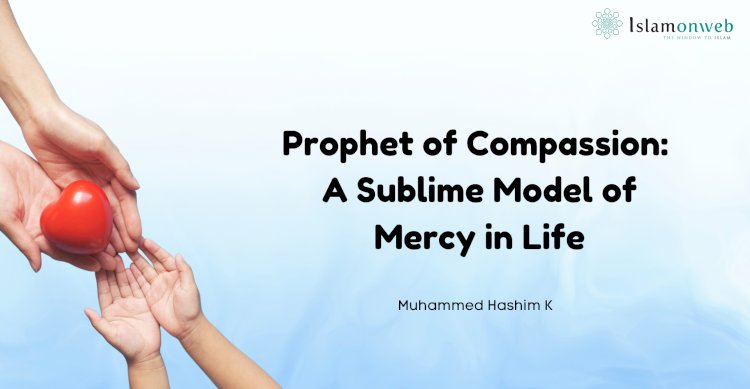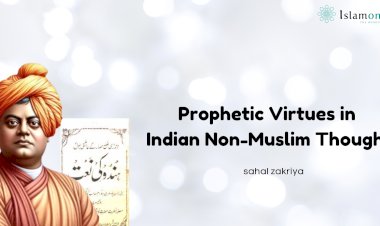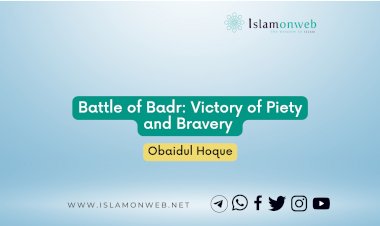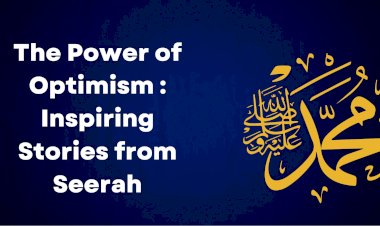Prophet of Compassion: A Sublime Model of Mercy in Life
In today’s world, where compassion often feels like a rarity and empathy is in short supply, the life of Prophet Muhammad ﷺ is an enduring example of mercy and kindness. His life wasn’t just one of spirituality but of genuine care for all creatures, human or otherwise. He wasn’t merely a leader; he was a teacher of love, concern, and mercy for the world, and his compassion remains a timeless model for how we should treat one another. The Prophet ﷺ was a beacon of mercy, his life exemplifying the divine attributes Raḥmān (the Compassionate) and Raḥīm (the Merciful), which reflect the boundless mercy Allah shows His creation. These divine qualities are manifest in every moment of Prophet Muhammad’s ﷺ life. He was sent as a Raḥmatun lil ‘Ālamīn (Mercy to the Worlds), and his mission was not one of judgment but healing, love, and divine mercy. His character exemplified these traits in every action, and his compassion was limitless.
One of the core messages of Islam is the emphasis on mercy and kindness. The terms Raḥmān and Raḥīm, derived from the word Raḥmah, meaning tenderness and compassion, are central to Islam, and the Prophet (PBUH) embodied them fully. He respected Allah’s commandments while simultaneously showing immense love and kindness toward all of Allah’s creatures. Raḥmān symbolizes Allah’s mercy for all of His creations, while Raḥīm refers to His mercy specifically for the believers. This dual expression of mercy underscores the Prophet’s role as a leader of compassion.
The Qur'an encapsulates the essence of Prophet Muhammad’s ﷺ mission in the verse, “And We have not sent you, [O Muhammad], except as a mercy to the worlds” (Qur'an21:107).This divine declaration confirms that the Prophet’s mission was to be a source of compassion and benevolence for the entire universe, not just for Muslims. His life, teachings, and actions were a reflection of that sacred duty, and they continue to inspire those who seek to emulate his example of mercy and kindness.
The Prophet’s ﷺ life was one of humility and care for everyone around him. He showed empathy toward the poor, the weak, orphans, and women, and his heart brimmed with mercy, even for his enemies. One of the most profound examples of this occurred during the conquest of Mecca. After years of persecution, when the Prophet ﷺ had the opportunity to exact revenge on those who had wronged him, he chose to forgive. His message to the people of Mecca was one of peace: “Go, for you are free.” (Haykal, 1976).This singular act of forgiveness underscores the Prophet’s deep understanding of mercy — not just as a concept, but as a guiding principle for life.
Prophet Muhammad’s ﷺ compassion extended beyond people to animals and all of creation. In one famous incident, he saw a mother bird in distress because someone had taken her baby birds. The Prophet ﷺ immediately asked who had caused the bird such pain and ordered the return of her babies. He even understood the emotions of animals, as shown in another incident when a camel approached him with tears, and the Prophet ﷺ instructed the owner to treat the animal more kindly. These stories illustrate his deep empathy and sensitivity to the feelings and needs of all creatures, human or otherwise.
The Prophet’s ﷺ teachings stressed that showing mercy to others opens the door to receiving mercy from Allah. One of his most well-known teachings is, “Show mercy to those on Earth, and the One in the Heavens will show mercy to you.” (Al-Bukhari) His life was an active embodiment of this principle, demonstrating through his actions how living with kindness and compassion creates harmony not just with other people but with the entire natural world.
The Prophet’s ﷺ kindness toward orphans is another profound aspect of his mercy. Having lost his parents at a young age, he understood the pain of orphanhood and was especially sensitive to the needs of orphans. He made it a priority to ensure they were treated with dignity and love. The Qur’an commands, “Therefore, treat not the orphan with harshness, nor repulse him who asks” (93:9-10), and the Prophet ﷺ always reminded his followers of the importance of caring for orphans, promising paradise to those who raised them with compassion. His care for orphans reflects his broader mission of ensuring that the vulnerable in society are always protected and treated with kindness.
Beyond personal interactions, Prophet Muhammad’s ﷺ message encompasses universal values that transcend time and place. He taught tolerance, peace, justice, and brotherhood — values that extend beyond religious boundaries. Islam, as he taught it, is a way of life that seeks to create harmony and peace among all people, not just Muslims. His farewell sermon emphasized the equality of all humans and the importance of treating others with respect and kindness. This message resonates in today’s world, where issues of inequality and injustice continue to challenge humanity’s moral compass.
Today, the world requires the Prophet’s message more than ever. His compassion toward women, the elderly, the poor, and even strangers sets a precedent for how we should behave toward one another. The Prophet (PBUH) was a leader, not through power or wealth, but through love and mercy. His life teaches us that the true measure of greatness is how we treat those around us, especially the vulnerable and marginalized. His stress on kindness and love — not hatred or violence — compels every believer to follow his example, demonstrating that compassion is not a sign of weakness but of profound moral strength.
Prophet Muhammad’s ﷺ tender nature is affirmed in the Qur’an, where it is said, “A Messenger has come to you from among yourselves. Your suffering is distressing to him; he is deeply concerned for you; he is gentle and merciful to the believers” (Qur'an9:128). This verse encapsulates the Prophet’s deep empathy for his community and his tireless efforts to alleviate their suffering. His empathy was not limited to moments of personal interaction but permeated all aspects of his leadership and life, reminding us that the essence of Islam is mercy.
In a world filled with division and conflict, the Prophet’s life offers a remedy: kindness, understanding, and mercy. Through his actions, the Prophet ﷺ taught us that love is stronger than hate, and compassion has the power to transform lives. His teachings remind us that the world can only heal through acts of mercy, forgiveness, and empathy. It is now our responsibility to carry forth this message of mercy, embodying it in our daily lives and interactions, just as the Prophet ﷺ did.
In an era where compassion and compromise seem to have faded into obscurity, speaking about the boundless mercy exhibited by Prophet Muhammad ﷺ is not just a duty but an honour. The Qur'an introduces him as “a mercy to the worlds” (Qur’an 21:107), a title that reflects his deep compassion not only for mankind but for all creatures and objects in the universe. The Prophet’s life manifests mercy, offering guidance and light to all who seek it. His life was a living example of mercy, demonstrating unparalleled kindness to the elderly, children, women, and the vulnerable. His empathy wasn’t limited to people; it extended to animals and even inanimate objects, showing us the depth of his mercy.
One well-known example of the Prophet’s compassion can be seen when he kissed his grandsons, Hasan and Husayn. Al-Aqra bin Habis, a companion, observed this and remarked, “I have ten children, and I have never kissed any of them.” The Prophet ﷺ replied, “Whoever does not show mercy will not be shown mercy.” (Al-Bukhari, Ṣaḥīḥ al-Bukhārī) This simple interaction highlights the Prophet's deep connection and love for children, urging us to follow his example in showing affection and kindness.
In a world where wars are fought ruthlessly and innocent lives are often sacrificed without remorse, the Prophet’s ﷺ actions stand as a monumental example of forgiveness and mercy. His legacy remains a beacon for us today, urging us to embody these same values of compassion, forgiveness, and understanding. As believers, we are responsible for adopting the Prophet’s model of mercy and living in a way that radiates kindness to all.
About the author :
Muhammed Hashim K, hailing from Moochikkal, Malappuram. Holds a BA in English Literature and is currently pursuing an MA in Arabic Literature from Indira Gandhi National Open University, as well as a Master's in Islamic and Contemporary Studies from Jamia Jalaliyya Mundakkulam.
Bibliography
Al-Bukhari. (n.d.). Ṣaḥīḥ al-Bukhārī. (M. M. Khan, Trans.) Dar-us-Salam Publications.
Al-Bukhari. (n.d.). Ṣaḥīḥ al-Bukhārī . (M. M. Khan, Trans.) Dar-us-Salam Publications.
Haykal, M. H. (1976). The Life of Muhammad. (I. R. al-Faruqi, Trans.) Islamic Book Trust.
Qur'an21:107. (n.d.). (M. A. Haleem, Trans.) Oxford University Press.
Qur'an9:128. (n.d.). (M. A. Haleem, Trans.) Oxford University Press.
Disclaimer
The views expressed in this article are the author’s own and do not necessarily mirror Islamonweb’s editorial stance.

























Leave A Comment